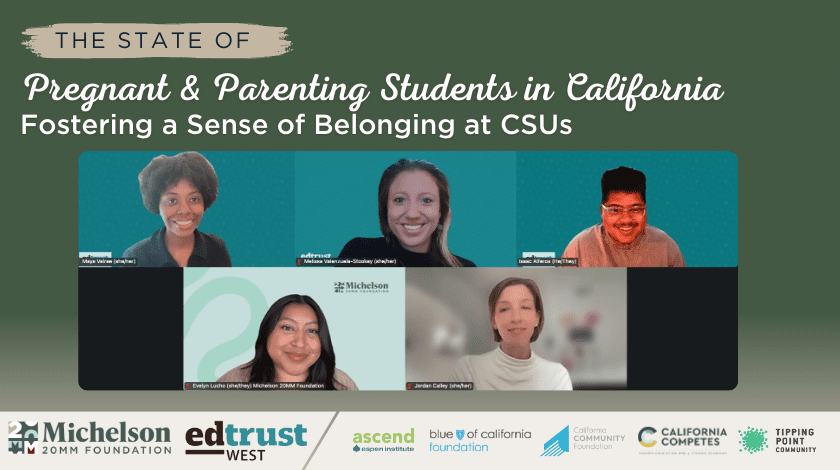By Evelyn Lucho
Students of color at four-year institutions often feel less of a sense of belonging on campus. In California, the K-12 Healthy Kids Survey found Black students are more than twice as likely as white peers to report low school connectedness. Additionally, Black parents make up a disproportionate share of the parenting student population, highlighting the urgent need to address their experiences and sense of belonging.
Understanding this, on December 12th, the Michelson 20MM Foundation hosted “The State of Pregnant and Parenting Students in California: Fostering a Sense of Belonging at CSUs.” Isaac Alferos, Melissa Valenzuela-Stookey, and Maya Valree of EdTrust-West previewed key findings from their “Sense of Belonging” survey, while Jordan Calley added her perspective as a student parent.
What Is Belonging, and Why Is It Important?
The webinar explored the sense of belonging among parenting students, examining whether they feel integral parts of their campus identity. Research from EdTrust West emphasized the benefits of fostering belonging, including how being a parent strengthens students. Parenting students reported better time management, self-determination, a desire to be role models for their children, and increased motivation—all leading to better academic outcomes.
“There was a very clear articulation of skills and competencies that help someone thrive in a college environment, being gained and built upon because they are a parent,” said Melissa Valenzuela-Stookey, director of P-16 research at EdTrust-West.
The data also revealed how well parenting students’ needs are being met and identified gaps that institutions can address. Nearly three in four respondents felt included on campus, but the picture shifted when focusing on their identity as student parents. Over half felt uncertain about belonging, and nearly half felt they did not fit in when considering their role as student parents. These findings highlight the need to address the unique challenges parenting students face to support their success.
The study also examined how parenting students access information about resources and policies to support their success and belonging. Respondents most often cited the need for clearer, more accessible resources. Less than half could easily find information about support for student parents, revealing a significant gap in awareness.
The findings showed most parenting students were unaware of campus resources like priority access, financial assistance, off-campus childcare, and parenting classes. This disconnect can isolate parenting students and undermine their sense of belonging on campus. When students can’t easily access resources meant to support them, it sends the message that their needs are unprioritized, making it harder to feel valued on campus. Improving the visibility and accessibility of information is crucial to fostering a stronger sense of belonging and ensuring parenting students receive the support they need to thrive.
How Can We Support Parenting Students?
Creating supportive policies and resources is key to fostering parenting students’ sense of belonging on campus. Respondents emphasized that clear policies regarding minors on campus are essential to eliminate ambiguity for students, staff, and faculty. Student parents recommend adding a family-friendly syllabus statement to help parenting students feel acknowledged and valued.
“A sense of belonging (to me) means that I’m allowed to show up every day as my authentic self and embrace my role and identity as a parent, and those experiences, without feeling othered or judged… It also means acknowledging that student parents exist and that our participation on campus is welcome and valid,” said Jordan Calley, a student parent at San Francisco State University.
State policymakers must prioritize and allocate funds to develop or expand family-friendly spaces and resources on campuses. These resources include childcare centers, family resource centers, lactation spaces, changing tables, and 24-hour family-friendly study rooms.
As emphasized during the discussion, “those closest to the issues intuitively know the solutions.” Centering policies and practices on parenting students’ voices and experiences is key to bridging gaps in support, affirming their place within the campus community, and strengthening their sense of belonging.
Michelson 20MM is a private, nonprofit foundation working toward equity for underserved and historically underrepresented communities by expanding access to educational and employment opportunities, increasingaffordability of educational programs, and ensuring the necessary supports are in place for individuals to thrive. To do so, we work in the following verticals: Digital Equity, Intellectual Property, Smart Justice, Student Basic Needs, and Open Educational Resources (OER). Co-chaired and funded by Alya and Gary Michelson, Michelson 20MM is part of the Michelson Philanthropies network of foundations.
To sign up for our newsletter, click here.

